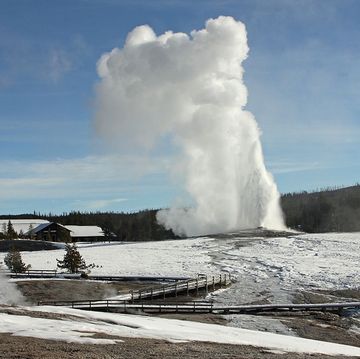The fart is the ugly stepchild of bodily functions. The sneeze, the cough, and the hiccup have earned their place in proper society. Even the burp is excusable. But farts still get no respect.
Did you know that last Wednesday was National Pass Gas Day? Neither did we! Most media outlets didn't even acknowledge it, and to be honest, we can't blame them. After all, if prepubescent boys have taught us nothing else, it's that you should never, ever be the first person to identify a fart. He who smelt it, they say, has most certainly dealt it.
"Farting is one of those unmentionables because it reminds people of our animal origins," says flatulence expert Jim Dawson, author of the books Who Cut the Cheese?, Blame It on the Dog and, most recently, Did Somebody Step on a Duck? "It still has a certain shock value to it."
You could fill a textbook with What You Don’t Know about Your Farts. But it's more than just the physiological aspects of farts that get ignored. There's a fascinating history of farting that you never heard about at school (unless you went to the most awesome, fart-friendly school in the world). Where are the Howard Zinns of flatulence?
Well, I did once almost get beaten up in jail for a fart. So I suppose if anybody is qualified to be your fart historian, offering you the most comprehensive exploration of historical farts ever assembled, it would be me. Let's do this.
Wind of Change
In 569 B.C., according to Greek historian Herodotus, a single fart sparked a revolt against King Apries of Egypt.
It started when Apries sent one of his generals, Amasis, to quash a rebellion among his troops. But the rebels crowned Amasis the new king which, as Mel Brooks would note a millennium and a half later, it's good to be.
So Apries sent over another dude, a popular advisor named Patarbemis. According to Herodotus, Amasis honked his rectum and told Patarbemis to "carry that back to Apries."
It's not known how exactly this message was relayed, but Apries responded by ordering the nose and ears lopped off his messenger. News of this brutality swayed Egyptians against their king, who was eventually torn apart by a mob, and insured the official reign of Amasis from 569 to 525 B.C.
Gassover
A fart in Jerusalem in 44 A.D. led to the deaths of 10,000 people. In his 75 A.D. bestseller, The Jewish War, Josephus (37-100) describes an anti-Semitic Roman soldier who dropped trou before a crowd of Jews celebrating Passover. The guy "pulled back his garment, and cowering down after an indecent manner, turned his breech to the Jews, and spake such words as you might expect upon such a posture."
This angered the Jews, the angriest of whom began stoning the soldiers. The Roman leader of Jerusalem, Cumanus (no joke), called in backup and a riot ensued. Most of the dead were Jews killed as they trampled each other trying to escape the Temple, where they crowded when the Roman Army arrived.
"This was the granddaddy of all fart destruction," Dawson says. "As far as a direct result of a fart, you can't get bigger than this."
The Wizard of Ass
In Francois Rabelais' Gargantua and Pantagruel, published in 1532 and widely considered the first fantasy novel, a giant rips one so powerful, it creates actual little people: "But with the fart he blew the earth trembled for twenty-seven miles round, and with the fetid air of it he engendered more than fifty-three thousand little men, misshapen dwarfs."
Fans of the book note that it synchronizes perfectly to Pink Floyd’s Dark Side of the Moon.
Parliament Fart-Adelic
In 1607, British Member of Parliament Henry Ludlow farted during a debate about naturalizing the Scots. The farting nay-vote was probably an accident, but it passed into folklore, inspiring many poems including The Censure of the Parliament Fart. No reBUTTals were reported.
Founding Fartman
In 1781, while Benjamin Franklin lived abroad as U.S. Ambassador to France, he wrote an essay called "Fart Proudly." Distributed to friends but never published, it includes the lines: "A few Stems of Asparagus eaten, shall give our Urine a disagreable Odour; and a Pill of Turpentine no bigger than a Pea, shall bestow on it the pleasing Smell of Violets. And why should it be thought more impossible in Nature, to find Means of making a Perfume of our Wind than of our Water?"
Trust us. For 1781, this was hysterical.
(From a Japanese scroll, titled "He-Gassen"—translated as “Fart Battle"—dated approx. 1846)
The Real Fartman
As a child, Joseph Pujol (1857-1945) discovered himself in possession of a superpower that would save no one. He could inhale air through his rectum and expel it, much as some people do with belches only much, much grosser.
Taking the stage name Le Petomane (fartomaniac), the Frenchman went on perpetual tour, ass-blowing out candles, ass-playing the flute and even ass-smoking cigarettes. At his peak, Le Petomane outgrossed even popular actress Sarah Bernhardt—in every sense of the word "outgrossed."
Adolf Shitler
Not that Adolf Hitler wasn’t already crazy, but it couldn't have helped that the flatulence he suffered—according to medical reports—led him to poison himself with medications containing strychnine and Atropene.
"Hitler suffered from uncontrollable farting," Dawson says. "By 1936, the cramps were so severe, he said that he could scream." So Hitler’s consulted Berlin doctor Theodor Morell, who prescribed Dr. Koester’s Anti-Gas pills, which contained the poisons in amounts that were less than immediately lethal. (And this still may have been better than Hitler's favorite fart medication before that, which contained machine oil.) By early 1941, when Hitler was invading the Soviet Union, he was up 120 to 150 pills a week.
“Strychnine and Atropene tends to make you very edgy and affects your sleep and emotional health,” says Dawson. How large a part his fart treatments played in World War II and the Holocaust, we'll never know. But when the effects of his pills became known—only six months before the mentally eroded Furor killed himself in his bunker—Morell was fired and barely escaped with his life.
Ironically, Hitler’s flatulence, according to biographer John Toland, was caused by the most widely known benevolent thing about him: his vegetarianism.
Smelluloid Hero
The farts of the Blazing Saddles campfire scene were louder and more famous. But Hollywood's ass-wind barrier was broken three years earlier by Norman Lear, in a little-seen 1971 film called Cold Turkey starring Dick Van Dyke, Bob Newhart, and the by-then elderly Edward Everett Horton, who dealt the flatulence in question.
The film could have made fart history two years earlier, when it was made, but it was shelved due to concerns (later justified) about its box-office potential. In fact, Horton was dead by its release date, robbed of the chance of basking in his historical significance.
Record Breaker of Wind
According to the Guinness Book of World Records, Bernard Clemmens of London has the longest official butt burp at 2 minutes, 42 seconds.
(Farts are always funnier when they're happening to somebody else. Make sure your gas-passing is at a minimum with our video guide to Fending Off Flatulence.)














